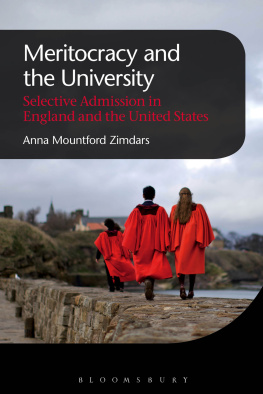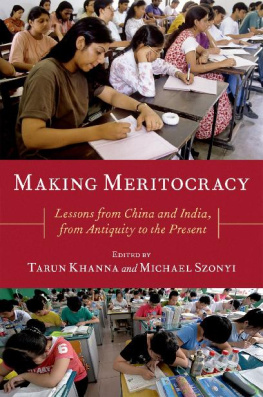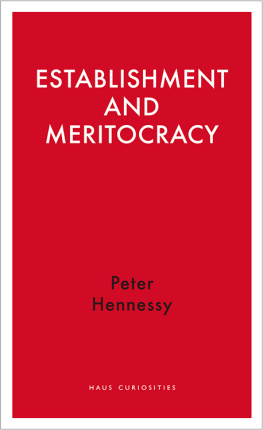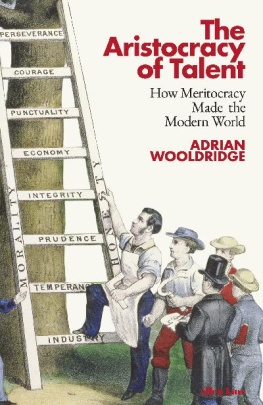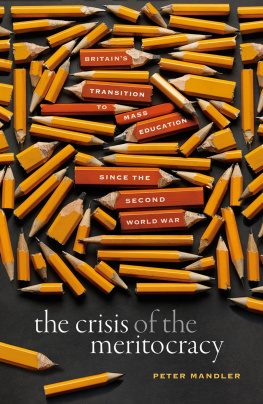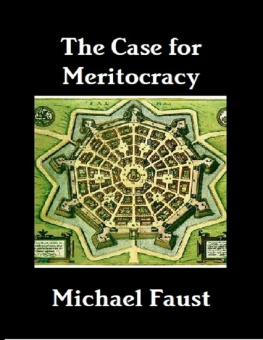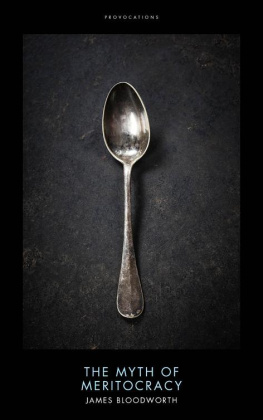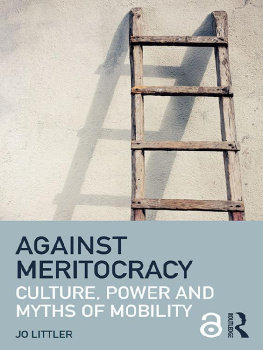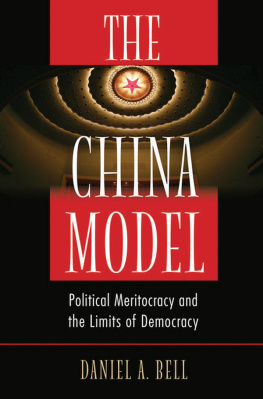Mountford-Zimdars - Meritocracy and the University
Here you can read online Mountford-Zimdars - Meritocracy and the University full text of the book (entire story) in english for free. Download pdf and epub, get meaning, cover and reviews about this ebook. publisher: Bloomsbury UK, genre: Politics. Description of the work, (preface) as well as reviews are available. Best literature library LitArk.com created for fans of good reading and offers a wide selection of genres:
Romance novel
Science fiction
Adventure
Detective
Science
History
Home and family
Prose
Art
Politics
Computer
Non-fiction
Religion
Business
Children
Humor
Choose a favorite category and find really read worthwhile books. Enjoy immersion in the world of imagination, feel the emotions of the characters or learn something new for yourself, make an fascinating discovery.
- Book:Meritocracy and the University
- Author:
- Publisher:Bloomsbury UK
- Genre:
- Rating:4 / 5
- Favourites:Add to favourites
- Your mark:
- 80
- 1
- 2
- 3
- 4
- 5
Meritocracy and the University: summary, description and annotation
We offer to read an annotation, description, summary or preface (depends on what the author of the book "Meritocracy and the University" wrote himself). If you haven't found the necessary information about the book — write in the comments, we will try to find it.
Meritocracy and the University — read online for free the complete book (whole text) full work
Below is the text of the book, divided by pages. System saving the place of the last page read, allows you to conveniently read the book "Meritocracy and the University" online for free, without having to search again every time where you left off. Put a bookmark, and you can go to the page where you finished reading at any time.
Font size:
Interval:
Bookmark:

Meritocracy and the University
Also available from Bloomsbury
Rethinking Knowledge within Higher Education: Adorno and Social Justice , Jan McArthur
Academic Working Lives, Experience, Practice and Change , edited by Lynne Gornall, Caryn Cook, Lyn Daunton, Jane Salisbury and Brychan Thomas
Academic Identities in Higher Education: The Changing European Landscape , edited by Linda Evans and Jon Nixon
Learning Communities in Imagined Social Capital: Learning to Belong , Jocey Quinn
Interpretative Pedagogies for Higher Education: Arendt, Berger, Said, Nussbaum and their Legacies , Jon Nixon
Towards Teaching in Public: Reshaping the Modern University , edited by Mike Neary
Acts of Knowing: Critical Pedagogy in, Against and Beyond the University , Stephen Cowden
Meritocracy and the University
Selective Admission in England and the United States
Anna Mountford Zimdars
Bloomsbury Academic
An imprint of Bloomsbury Publishing Plc

Contents
No book of this sort is ever the work of just one individual and many people share the credit for the completion of this project. I am grateful to all who have generously contributed through participating in interviews and informal conversations. I would like to thank the respondents who participated in this project for generously giving their time and sharing their experiences. I am grateful for your contributions and I am sorry I cannot give you all named credit due to research confidentiality.
I would also like to thank the following named people for their particular contributions: Special thanks to William R. Fitzsimmons, Dean of Admissions and Financial Aid at Harvard, for hosting me at the Harvard Summer Institute on College Admissions and to all attendees at the event who have explained aspects of US college admission. Special thanks also to the Sutton Trust for inviting me to attend an event that discussed elite higher education in England and the United States. Professor Mitchell Stevens generously facilitated and mentored me through a research visit to New York University, and shared his insights into how college admission works. Special thanks also to Janet Graham, Director of Supporting Professionalism in Admissions, Dr Samina Khan, Director of Admissions, University of Oxford, Dean Fitzsimmons and Barbara Geier for their comments and corrections on the first draft of the book, and Professor Michael Bastedo for some factual clarifications. The work of the editors at Bloomsbury, Caroline Wintersgill and Alison Baker, is also gratefully acknowledged.
Last but not least, I am grateful for the opportunities for formal and informal exchange and discussion provided by the conferences in my field, namely SRHE, BERA and ECER as well as events organized by HEFCE and SPA and the Higher Education Study Group at Kings College and discussions with friends and colleagues. Funding from the SRHE and the ESRC is gratefully acknowledged. All errors and omissions are my own.
If we get admissions right, the rest looks after itself.
(Ivy League admissions professional)
This is a book about undergraduate admission to renowned highly selective universities in the United States and England. Admission to one of the leading universities including Cambridge and Oxford in England and Harvard, Princeton, and Stanford in the United States carries kudos, social cache and the promise to open doors for some career entries. There is great public and media interest in who is admitted to these institutions. As one admissions professional working for a US Ivy League (see glossary) institution noted, this fascination is due to admission being a high stake game, because it is a mystery, and it is a ritual that is great to watch.
But how does selection to these universities actually work? What are the ideas that underlie their admission decisions and processes? What are these institutions looking for in students? Making sense of the aims and processes of selective admissions through a comparative perspective is the aim of this book: the book offers an insight into the curious world of university admissions.
Applying for post-secondary education and enrolling at university can be an emotional phase in the lives of students and their families. Especially for those going to university straight after school, it can mean, for the first time in their lives, moving away from a known social environment and from their circles of friends. This might also entail geographic moves and the formation of new identities for students and their families, as well as a new journey of learning and discovery. Indeed, the highly selective universities in this book are built around a residential student experience model, which sees students live and dine together while pursuing full-time undergraduate study. Many of us will either have experienced a transition from school to university or know someone who has gone through the university admissions process (or someone who is considering joining a university). Moreover, just as sporting competitions like the Olympics, the US Open or Wimbledon offer a moment for reflecting on the state of sport in a nation, university admissions can provide an annual focal point for national debates on the state of the education system in a country. It is a time when new statistics comparing universities emerge, when applicants reflect on their experiences of navigating the admissions process, when recent graduates share their stories about entering or trying to enter the world of work, and it can be a time to think of the things that work well and to reflect on potential flaws within the current system.
Not surprisingly then, admissions decisions, and especially those involving selective universities, feature prominently in public life. Admissions decisions are discussed by students, parents, families and schools as well as in the media; they are subject to judicial reviews in the courts, and are debated by politicians in parliament. They are part of our national consciousness.
In England, disagreement with an individual admissions decision was commented on in the highest echelons of politics: In 1999, Laura Spences unsuccessful application to study medicine at the University of Oxford led the then Chancellor of the Exchequer (and later prime minister) Gordon Brown to accuse Oxford of elitism. In his words, Laura Spences rejection was an absolute scandal (). In 2013, the Supreme Court ruled on the rejection of Abigail Fishers application to the University of Texas (Fisher v University of Texas at Austin et al. 2013). The most powerful court in the world has thus repeatedly decided whether students had been wrongly denied admission by a particular university. Most recently, in 2014, the Supreme Court upheld the ban on affirmative action in higher education in the state of Michigan, a decision affecting seven further states with similar bans. In England, cases of non-admission very rarely get as far as the law courts as the Higher Education Act 2004 has laid down that university admissions in the UK is the responsibility of individual universities and should be based on academic judgement.
It is not only the political and legal debates surrounding admission that are fierce. The competition involved in admission to some of the best-known universities in the world is also becoming fiercer every year, with more students applying for a limited number of undergraduate places. Every year, many applicants often with an array of the highest possible scores in their prior schooling fail to gain admission to their first-choice university. Selective universities admit only a few for undergraduate study, about one in fourteen at the most selective US universities and about one in five of highly self-selected candidates at Cambridge and Oxford in England are successful. There are even lower success rates at some other institutions and for specific courses. Some admissions decisions take teachers, parents and career advisers by surprise: Josh might not be admitted to his first-choice university this year although Amy, from the same school, had been admitted with a similar schooling record in the previous year. Such stories can make what happens in the admissions process appear like the functioning of a black box.
Font size:
Interval:
Bookmark:
Similar books «Meritocracy and the University»
Look at similar books to Meritocracy and the University. We have selected literature similar in name and meaning in the hope of providing readers with more options to find new, interesting, not yet read works.
Discussion, reviews of the book Meritocracy and the University and just readers' own opinions. Leave your comments, write what you think about the work, its meaning or the main characters. Specify what exactly you liked and what you didn't like, and why you think so.

